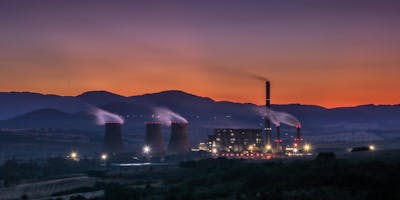You must login before you can post a comment.
- 👔
Nuclear Energy: Challenges and Opportunities in a Fossil-Free Future
Science & Technology
There will be two presentations at this event, the first by Paul Dorfman, Honorary Senior Research Associate at the UCL Energy Institute and the second by Paul Spence, Director of Strategy and Corporate Affairs EDF.
Presentations
Paul Dorfman will present: Nuclear and the Climate Crisis: French Kisses, Russian Dolls and Chinese Whispers
Recent reviews of the impact of climate change suggest that, over the next few decades, we will be subject to significant change in human health, welfare and environmental systems. Key to adapting to this change is the transition to a low carbon and resource efficient energy economy, involving major structural changes to the way we work and live. The challenge of achieving this may involve a series of technically and economically viable options, including the expansion of renewable energies in all sectors, rapid growth and modernisation of electricity grids, improvements in energy efficiency, the use of modern technologies to minimise electricity consumption, rapidly enhanced storage technologies, market innovations from supply to service provision, intelligent deployment of limited gas resources, the fundamental re-structuring of the built and transport environments and, some argue, continued reliance on nuclear power. Yet, at the heart of the nuclear issue are differing views on how to apply foresight, precaution and responsibility in the context of the relative economics of nuclear, the uncertain role of nuclear in combating climate change, the possibility of accidents, the consequence of those accidents, and whether there exists a role for nuclear within the swiftly expanding renewable energy evolution.
Paul Spence will present:
The UK needs a diverse mix of generation to deliver enough reliable low-carbon electricity to transition large parts of the economy, including home heating and transport, from fossil fuels. We need technologies to deliver at scale. The Committee on Climate Change projects a four-fold increase of low-carbon electricity. And we need technologies that can deliver reliably, as customers need electricity round-the-clock, summer and winter. Existing and new nuclear power is an important contributor. It is proven, cost-effective and safe; and manages arising waste. Furthermore, nuclear has unique technical characteristics to support a low-carbon energy mix and has positive impact on host communities.
Hinkley Point C is the UK’s first new nuclear plant since 1995. Construction of its twin reactors began in September 2016, and is well on track. It will generate 26 TWh of low-carbon electricity each year (7% of today’s electricity demand) over its 60-year life. Replication benefits, known as the ‘fleet effect’, are observable between reactors 1 and 2. Further construction risk and cost reductions are possible for planned reactors 3 and 4 at Sizewell C.
Getting to Net Zero with these reactors and others that follow will be more cost-effective and success more certain than other routes.
This event will be followed by a networking reception.
Accessibility
If you have any particular accessibility needs do contact us at [email protected] so we can ensure you're accomodated.
Accessibility details for Central House can be found here: https://www.accessable.co.uk/venues/central-house
Biographies
Dr Paul Dorfman is Honorary Senior Research Associate at the UCL Energy Institute, University College London; Joseph Rowntree Charitable Trust Nuclear Policy Research Fellow; Founder and Chair of the Nuclear Consulting Group; Member of the Irish Govt. Environment Protection Agency Radiation Protection Advisory Committee; Member of the International Nuclear Risk Assessment Group. Paul served as Secretary to the UK Govt. scientific advisory Committee Examining Radiation Risks from Internal Emitters; led the European Environment Agency response to Fukushima; served as Expert to the European Economic and Social Committee on the European Energy Dialogue; served as Advisor to the UK Ministry of Defence Nuclear Submarine Dismantling Project; was Advisor to the French Govt. National Assembly on la Faisabilité Technique et Financière du Démantèlement des Installations Nucléaire Français; and drafted UK Department of Health NHS Guidance. He regularly briefs and is quoted in the press and media, presents at conferences and drafts key reports.
Paul Spence joined the EDF Energy Executive Team in January 2009. His teams are responsible for R&D, Strategy, Policy & Regulation, Communications, and Supply Chain activities across EDF Energy in the UK. He also chairs EDF Energy’s UK R&D centre.
He currently serves on the board of Energy UK, the Energy Technologies Institute, and is a Fellow of the Energy Institute.
Before their acquisition by EDF he was Head of Strategy and Business Development for British Energy. He was with Accenture for 17 years with Accenture where he was Partner, responsible for the UK Energy Strategy and Human Performance practices. His early career included time with Davy McKee (London) Limited, and Ford Motor Company.
He holds an MBA from London Business School and a BSc in Engineering from the University of Bristol.



